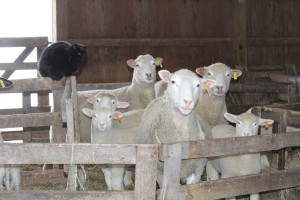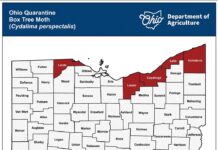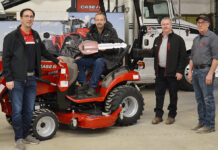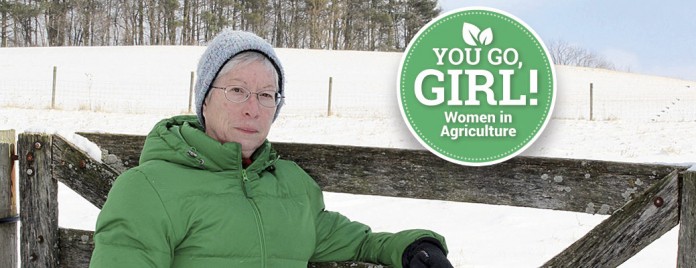(Editor’s note: We continue our eight-week series profiling some of the women who play key roles in the region’s agriculture. We’re proud to salute them — and others — who illustrate the diversity of farmers and farm leaders today.)
MILLERSBURG, Ohio — Sometimes one of the best leadership skills you can have is the ability to listen, and that’s a skill that has worked well for Leah Miller.
Ever since she graduated from Ohio State University with a degree in rural sociology, in 1971, Miller has been listening to people and helping them find solutions.
The Ashtabula County native started out as a planner in Lake County, before moving to Holmes County in 1973, where she worked as director of the county planning commission, community development consultant, and county commissioner, from 1990-1998.
Most people in the farm community know her today for her work on the Small Farm Institute, a nonprofit she formed in 2001 that helps organize farm conferences events in and around Holmes County.
Those include the North Central Ohio Dairy Grazing Conference, held each January in Dalton, and the Family Farm Field Day, held each summer at a different Amish farm.
“A group identifies that they want to do something and then I just facilitate helping it happen,” said Miller, 65.
Keeping it simple
She does a lot of her work out of other people’s homes and over kitchen tables, as well as her own home and farm, located just outside of Millersburg, atop a hilly area called Skyview.
She and her husband, Mic, manage 53 acres, half which is hay and the other half is woodland. They also keep 29 sheep.

She helped start the dairy grazing conference in 2001, after several farmers, mostly Amish, approached her about the need for programs that applied to their style of farming, and grass-based farming in general.
She had already been attending local pasture walks and grazing meetings, and made connections.
“I was kind of at the right place at the right time, with some of the right needs,” she said. “It was a situation where they planned what they wanted and I helped with the logistics of it.”
Rural upbringing
And, she had experience — not only a degree, but an upbringing in agriculture. She grew up on her parents’ Ashtabula County sheep and hay farm, where she showed sheep at the county fair and participated in vocational agriculture.
Her mother, Celia Wright, had worked in the rural sociology department at Ohio State, and her sister also studied rural sociology, later earning a Ph.D. from Cornell University.
“I have always been involved in rural communities, liked rural communities and see them as a very viable part of our bigger, regional economics,” Miller said.
Soon after she came to Holmes County, she needed a pair of tires and that’s where she met her husband, who was working for the local tire business at the time. He earned a master’s degree in physics, and the two have lived in Holmes County since.
They have two sons, Ethan, 34, and Seth, 32. Mic is a retired sound engineer for the Hoover Company and is not into the sheep, as Leah is, but helps when something needs designed or built.
Building trust
One of her focus areas has been the Amish and plain communities, of which Holmes County has the largest population in the world.
In 2005, she helped area farmers organize the Family Farm Field Day — an annual family outing and educational event geared toward Amish farm families. Because of their small-scale, conservative approach, they needed a program that taught the kinds of skills they use.
The first year drew 1,800 people, and today, the event draws between 4,000-5,000, depending on weather.
Miller’s ability to work with the Amish and respect their culture was no small feat. She said her education helped her understand things like their culture, community and values, and she always tried to be trustworthy.
“I think it was that balance of building trust,” she said. “I never tried to put myself forward — I always tried to allow them to tell me what they wanted.”
But a lot of it still came down to acceptance.
“More than anything else, it was just their acceptance of me,” she said.
As the Amish population grew in other parts of the state, including near Leah’s parent’s farm, in Ashtabula County, she eventually found herself giving her father advice on how to build the same kind of connections and trust she learned to build in Holmes County.
Active leader
Ernest Martin, a dairy grazier from Richland County, was one of the founding members of the dairy grazing conference. He said Miller was an active leader during that process and continues to be today, for other farm programs.
“If you needed to ask her to do something or you had a suggestion, you considered it done,” he said. “Things happened when she started getting involved.”
Martin and some other farmers are working with Miller to host the first-of-its-kind Organic Farming Conference March 21 in Mount Hope.
She’s continuously involved with rural networking and farm program planning. But she still manages to enjoy some quiet time on her own farm — things like the wildlife, gardening, reading, hiking and traveling.
Ag careers
Miller sees good opportunity for ag careers, and for women to secure those jobs.
“I’m extremely — more so than ever — confident in what agriculture can do for employment and employment opportunities,” she said. “I think there’s lots of room in the niche areas as well as in the larger scale.”
She said younger women are realizing agriculture is a field for them to be involved in. But, she added, many women have long been involved with the farming, but are just now being recognized in the public light.
“I think what’s happening is women, in most cases, were always partners in it,” she said. “It’s just today that we’ve allowed them to be more visible and identifiable.”
More women in ag stories:
- Ones to watch: Young women in agriculture April 23, 2015
- At the helm of Ohio Cattlemen’s, Elizabeth Harsh works to ‘be fearless daily’ April 23, 2015
- Farm or nonfarm worlds: Extension dairy specialists know both sides April 16, 2015
- Ohio State researcher committed to the science of animal health April 9, 2015
- Donniella Winchell puts Ohio wine on the world stage April 2, 2015
- Breaking the ‘grass’ ceiling: East Ohio Women in Agriculture Conference draws 135 March 30, 2015
- Annie Warmke: Back to the Earthship March 26, 2015
- Judy Ligo: ‘I had to prove I knew what I was doing’ March 12, 2015
- Pitching farm life: Brenda Hastings takes dairy industry in an all new direction March 5, 2015
- The ones to watch: Help us find the millennials who will be tomorrow’s leaders in agriculture March 5, 2015
- It’s OK to ‘farm like a girl’ March 5, 2015











I work with a gardening and permaculture program at San Quentin Prison called the Insight Garden Program. Is there anyway to connect to Leah Miller directly about her work? Thanks so much–
Hello Amanda,
Thanks for contacting us. I’ve been out of town recently. You can try Leah’s email at: leah@smallfarminstitute.org. Let me know if that doesn’t work!
Chris